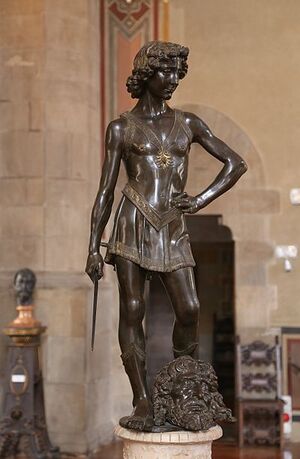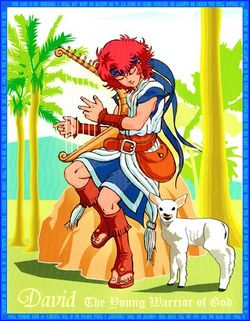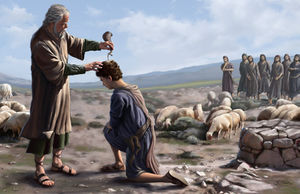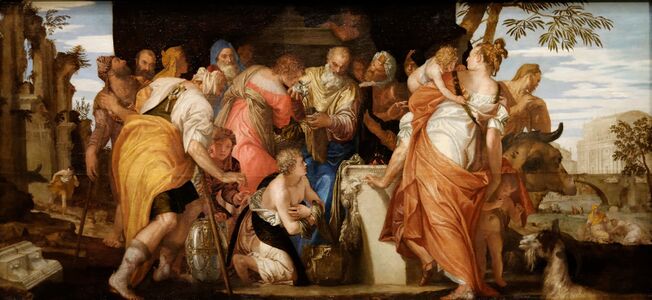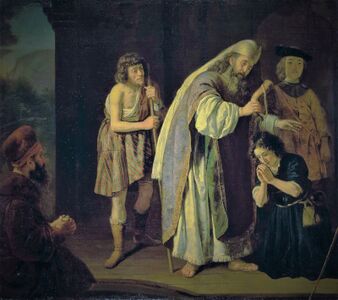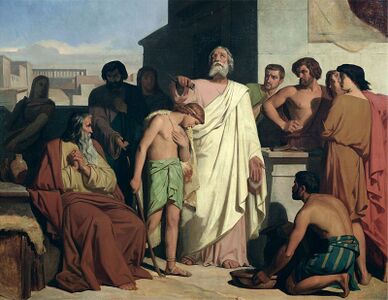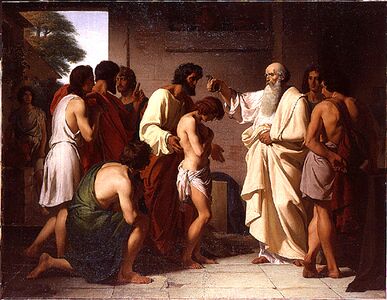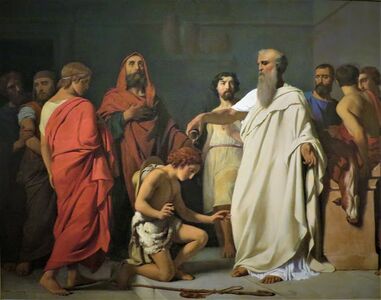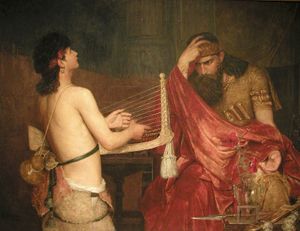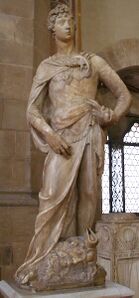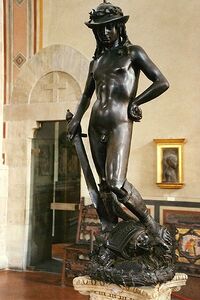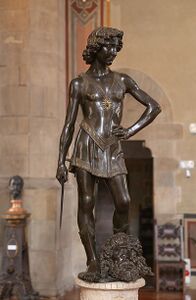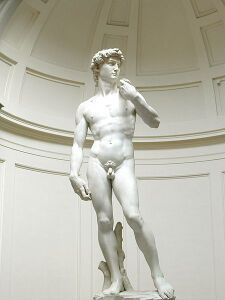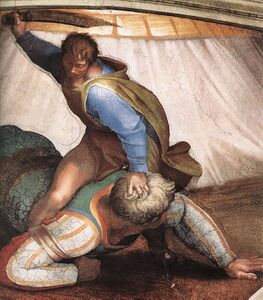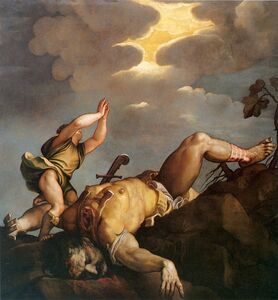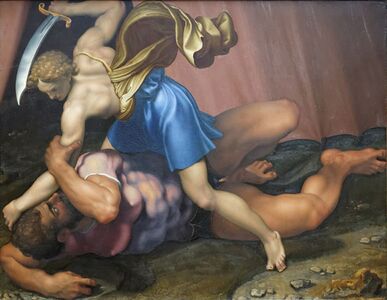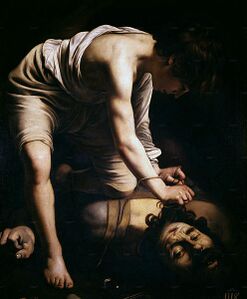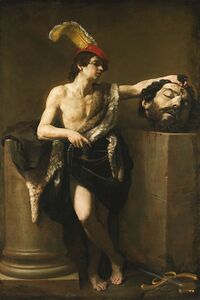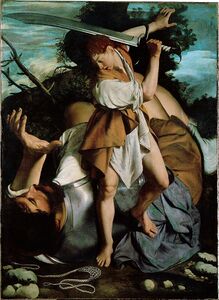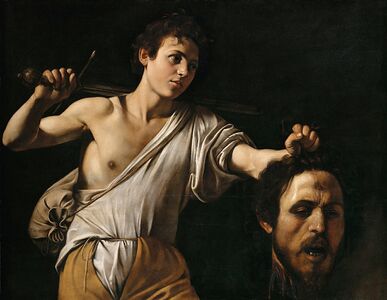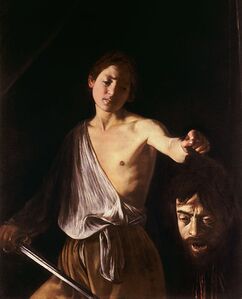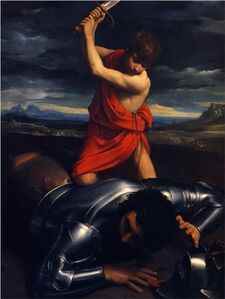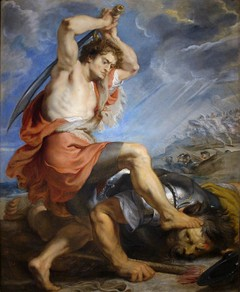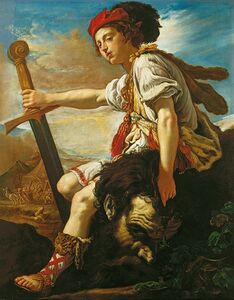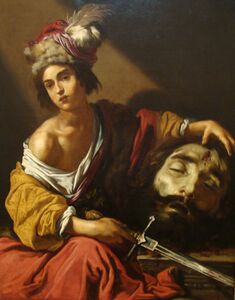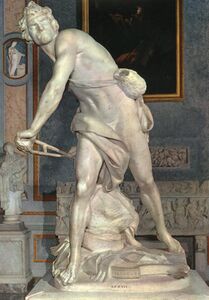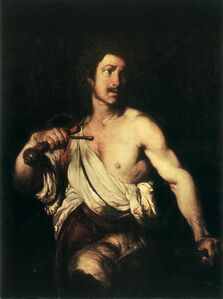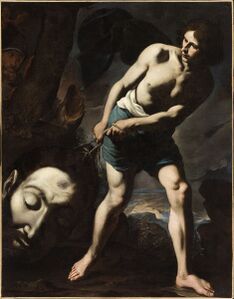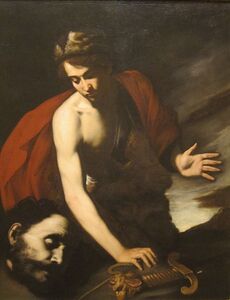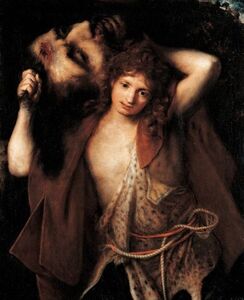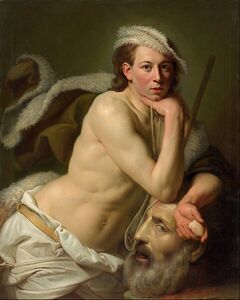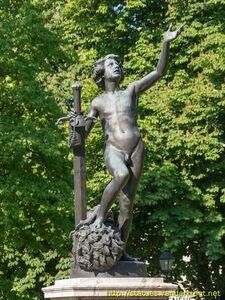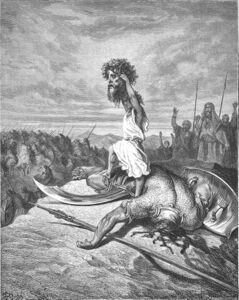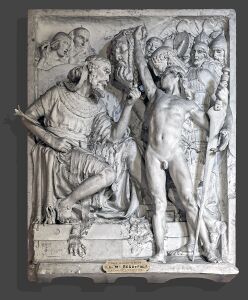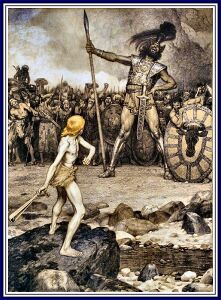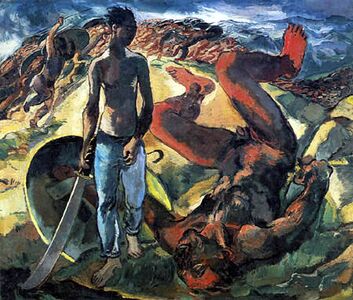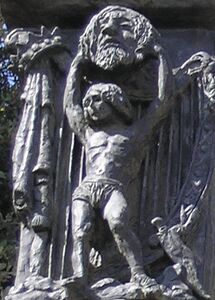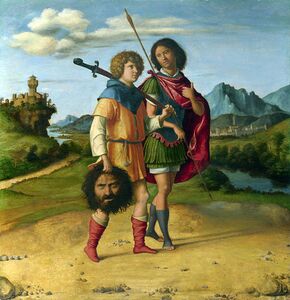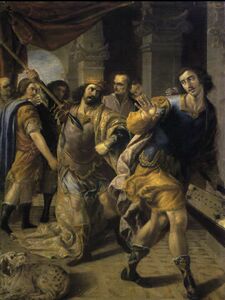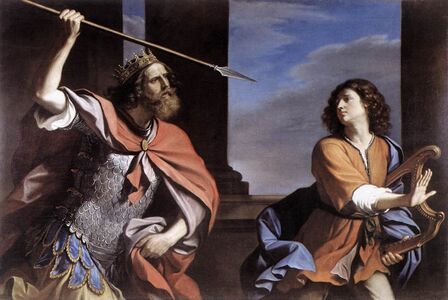Difference between revisions of "Category:Childhood of David (subject)"
| Line 154: | Line 154: | ||
File:David Jonathan Cima.jpg|[[Jonathan and David with the Head of Goliath (1510 Cima), art]] | File:David Jonathan Cima.jpg|[[Jonathan and David with the Head of Goliath (1510 Cima), art]] | ||
File:David Saul Leonardo.jpg|[[Saul Attacking David (1645 Leonardo), art]] | |||
File:David Saul Guercino.jpg|[[Saul Attacking David (1646 Guercino), art]] | File:David Saul Guercino.jpg|[[Saul Attacking David (1646 Guercino), art]] | ||
Revision as of 13:57, 13 February 2021
Childhood of David refers to the coming to age of David as described in 1 Samuel 16-17.
Overview
Childhood in ancient Israel is defined as the period between birth and marriage. David is one of the few characters in the Bible, whose childhood is described in more detail.
The Biblical account combine two stories, one in which David is a shepherd chosen by God who became famous by killing Goliath, and the other which describes him as Saul's armor-bearers and lyre-player, who grew up at Saul's court and distinguished himself as a warrior.
For a male, coming to age was marked by the ability to prove himself. For a shepherd it would be the ability to defend his flock from wild beasts, for a future (political and military) leader it would be his first killing of an enemy in battle.
(a) David Anointed as King
The First Book of Samuel and the First Book of Chronicles both identify David as the son of Jesse, the Bethlehemite, the youngest of eight sons. He also had at least two sisters, Zeruiah, and Abigail. The earliest Jewish tradition does not name his mother.
David is introduced in 1 Samuel 16 as a healthy "ruddy" boy, "with beautiful eyes" and "handsome" (1 Sam 16:12). He was the "youngest" of eight brothers, and "was keeping the sheep" (1 Sam 16:11). He had a good heart, too: "the Lord does not see as mortals see; they look on the outward appearance, but the Lord looks on the heart." (16:7). He was the one chosen by God as the future king of Israel. Still a young shepherd boy, the prophet Samuel anointed him to be king instead of Saul.
(b) David Plays the Lyre for Saul
A parallel tradition describes the young David as "skillful in playing, a man of valor, a warrior, prudent in speech, and a man of good presence; and the Lord is with him." David enters Saul's service as one of the royal armour-bearers and plays the lyre to soothe and confort the king when he was sick.
(c) David and Goliath
War comes between Israel and the Philistines, and the giant Goliath challenges the Israelites to send out a champion to face him in single combat. David was still too young to serve in the army. But he had been sent by his father to bring provisions to his brothers. He volunteered to fight against the champion of the Philistine, Goliath. Everybody was amazed by his courage. David refused the king's offer of the royal armour; he won the battle and killed Goliath with his sling. Like in the case of Moses, the future king had to prove himself by killing his enemy.
(d) David's Friendship with Jonathan and His Difficult Relation with Saul
Sexes lives segregated until marriage. For males, friendship with other boys was an essential experience of their coming to age. David and Jonathan became very close friends, and this saved David from Saul's anger. Saul is described as been more and more jealous of David's success.
(e) David Marries Saul's daughter Michal
As usual, the coming to age of David ends with his (first) marriage with Saul's daughter, Michal. Once again, David had first to prove his value by killing one hundred Philistines in battle. The marriage marks the end of David's childhood.
(a) David Anointed as King
In ancient sources
16 The Lord said to Samuel, “How long will you grieve over Saul? I have rejected him from being king over Israel. Fill your horn with oil and set out; I will send you to Jesse the Bethlehemite, for I have provided for myself a king among his sons.” 2 Samuel said, “How can I go? If Saul hears of it, he will kill me.” And the Lord said, “Take a heifer with you, and say, ‘I have come to sacrifice to the Lord.’ 3 Invite Jesse to the sacrifice, and I will show you what you shall do; and you shall anoint for me the one whom I name to you.” 4 Samuel did what the Lord commanded, and came to Bethlehem. The elders of the city came to meet him trembling, and said, “Do you come peaceably?” 5 He said, “Peaceably; I have come to sacrifice to the Lord; sanctify yourselves and come with me to the sacrifice.” And he sanctified Jesse and his sons and invited them to the sacrifice.
6 When they came, he looked on Eliab and thought, “Surely the Lord’s anointed is now before the Lord.”[a] 7 But the Lord said to Samuel, “Do not look on his appearance or on the height of his stature, because I have rejected him; for the Lord does not see as mortals see; they look on the outward appearance, but the Lord looks on the heart.” 8 Then Jesse called Abinadab, and made him pass before Samuel. He said, “Neither has the Lord chosen this one.” 9 Then Jesse made Shammah pass by. And he said, “Neither has the Lord chosen this one.” 10 Jesse made seven of his sons pass before Samuel, and Samuel said to Jesse, “The Lord has not chosen any of these.” 11 Samuel said to Jesse, “Are all your sons here?” And he said, “There remains yet the youngest, but he is keeping the sheep.” And Samuel said to Jesse, “Send and bring him; for we will not sit down until he comes here.” 12 He sent and brought him in. Now he was ruddy, and had beautiful eyes, and was handsome. The Lord said, “Rise and anoint him; for this is the one.” 13 Then Samuel took the horn of oil, and anointed him in the presence of his brothers; and the spirit of the Lord came mightily upon David from that day forward. Samuel then set out and went to Ramah.
In visual arts
(b) David Plays the Lyre for Saul
In ancient sources
14 Now the spirit of the Lord departed from Saul, and an evil spirit from the Lord tormented him. 15 And Saul’s servants said to him, “See now, an evil spirit from God is tormenting you. 16 Let our lord now command the servants who attend you to look for someone who is skillful in playing the lyre; and when the evil spirit from God is upon you, he will play it, and you will feel better.” 17 So Saul said to his servants, “Provide for me someone who can play well, and bring him to me.” 18 One of the young men answered, “I have seen a son of Jesse the Bethlehemite who is skillful in playing, a man of valor, a warrior, prudent in speech, and a man of good presence; and the Lord is with him.” 19 So Saul sent messengers to Jesse, and said, “Send me your son David who is with the sheep.” 20 Jesse took a donkey loaded with bread, a skin of wine, and a kid, and sent them by his son David to Saul. 21 And David came to Saul, and entered his service. Saul loved him greatly, and he became his armor-bearer. 22 Saul sent to Jesse, saying, “Let David remain in my service, for he has found favor in my sight.” 23 And whenever the evil spirit from God came upon Saul, David took the lyre and played it with his hand, and Saul would be relieved and feel better, and the evil spirit would depart from him.
(c) David and Goliath
In ancient sources
1 Samuel 17 -- 32 David said to Saul, “Let no one’s heart fail because of him; your servant will go and fight with this Philistine.” 33 Saul said to David, “You are not able to go against this Philistine to fight with him; for you are just a boy, and he has been a warrior from his youth.” 34 But David said to Saul, “Your servant used to keep sheep for his father; and whenever a lion or a bear came, and took a lamb from the flock, 35 I went after it and struck it down, rescuing the lamb from its mouth; and if it turned against me, I would catch it by the jaw, strike it down, and kill it. 36 Your servant has killed both lions and bears; and this uncircumcised Philistine shall be like one of them, since he has defied the armies of the living God.” 37 David said, “The Lord, who saved me from the paw of the lion and from the paw of the bear, will save me from the hand of this Philistine.” So Saul said to David, “Go, and may the Lord be with you!”
38 Saul clothed David with his armor; he put a bronze helmet on his head and clothed him with a coat of mail. 39 David strapped Saul’s sword over the armor, and he tried in vain to walk, for he was not used to them. Then David said to Saul, “I cannot walk with these; for I am not used to them.” So David removed them. 40 Then he took his staff in his hand, and chose five smooth stones from the wadi, and put them in his shepherd’s bag, in the pouch; his sling was in his hand, and he drew near to the Philistine.
41 The Philistine came on and drew near to David, with his shield-bearer in front of him. 42 When the Philistine looked and saw David, he disdained him, for he was only a youth, ruddy and handsome in appearance ...
48 When the Philistine drew nearer to meet David, David ran quickly toward the battle line to meet the Philistine. 49 David put his hand in his bag, took out a stone, slung it, and struck the Philistine on his forehead; the stone sank into his forehead, and he fell face down on the ground.
50 So David prevailed over the Philistine with a sling and a stone, striking down the Philistine and killing him; there was no sword in David’s hand. 51 Then David ran and stood over the Philistine; he grasped his sword, drew it out of its sheath, and killed him; then he cut off his head with it.
In visual arts
(d) David's Friendship with Jonathan and His Difficult Relation with Saul
In ancient sources
1 Samuel 18 -- 1 When David[a] had finished speaking to Saul, the soul of Jonathan was bound to the soul of David, and Jonathan loved him as his own soul. 2 Saul took him that day and would not let him return to his father’s house. 3 Then Jonathan made a covenant with David, because he loved him as his own soul. 4 Jonathan stripped himself of the robe that he was wearing, and gave it to David, and his armor, and even his sword and his bow and his belt. 5 David went out and was successful wherever Saul sent him; as a result, Saul set him over the army. And all the people, even the servants of Saul, approved.
6 As they were coming home, when David returned from killing the Philistine, the women came out of all the towns of Israel, singing and dancing, to meet King Saul, with tambourines, with songs of joy, and with musical instruments.[b] 7 And the women sang to one another as they made merry,
- “Saul has killed his thousands,
- and David his ten thousands.”
8 Saul was very angry, for this saying displeased him. He said, “They have ascribed to David ten thousands, and to me they have ascribed thousands; what more can he have but the kingdom?” 9 So Saul eyed David from that day on.
10 The next day an evil spirit from God rushed upon Saul, and he raved within his house, while David was playing the lyre, as he did day by day. Saul had his spear in his hand; 11 and Saul threw the spear, for he thought, “I will pin David to the wall.” But David eluded him twice.
12 Saul was afraid of David, because the Lord was with him but had departed from Saul. 13 So Saul removed him from his presence, and made him a commander of a thousand; and David marched out and came in, leading the army. 14 David had success in all his undertakings; for the Lord was with him. 15 When Saul saw that he had great success, he stood in awe of him. 16 But all Israel and Judah loved David; for it was he who marched out and came in leading them.
In visual arts
(e) David Marries Saul's daughter Michal
In ancient sources
17 Then Saul said to David, “Here is my elder daughter Merab; I will give her to you as a wife; only be valiant for me and fight the Lord’s battles.” For Saul thought, “I will not raise a hand against him; let the Philistines deal with him.” 18 David said to Saul, “Who am I and who are my kinsfolk, my father’s family in Israel, that I should be son-in-law to the king?” 19 But at the time when Saul’s daughter Merab should have been given to David, she was given to Adriel the Meholathite as a wife.
20 Now Saul’s daughter Michal loved David. Saul was told, and the thing pleased him. 21 Saul thought, “Let me give her to him that she may be a snare for him and that the hand of the Philistines may be against him.” Therefore Saul said to David a second time,[c] “You shall now be my son-in-law.” 22 Saul commanded his servants, “Speak to David in private and say, ‘See, the king is delighted with you, and all his servants love you; now then, become the king’s son-in-law.’” 23 So Saul’s servants reported these words to David in private. And David said, “Does it seem to you a little thing to become the king’s son-in-law, seeing that I am a poor man and of no repute?” 24 The servants of Saul told him, “This is what David said.” 25 Then Saul said, “Thus shall you say to David, ‘The king desires no marriage present except a hundred foreskins of the Philistines, that he may be avenged on the king’s enemies.’” Now Saul planned to make David fall by the hand of the Philistines. 26 When his servants told David these words, David was well pleased to be the king’s son-in-law. Before the time had expired, 27 David rose and went, along with his men, and killed one hundred[d] of the Philistines; and David brought their foreskins, which were given in full number to the king, that he might become the king’s son-in-law. Saul gave him his daughter Michal as a wife. 28 But when Saul realized that the Lord was with David, and that Saul’s daughter Michal loved him, 29 Saul was still more afraid of David. So Saul was David’s enemy from that time forward.
30 Then the commanders of the Philistines came out to battle; and as often as they came out, David had more success than all the servants of Saul, so that his fame became very great.
External links
Pages in category "Childhood of David (subject)"
The following 47 pages are in this category, out of 47 total.
1
- David (1409 Donatello), art
- David (1440 Donatello), art
- David (1475 Verrocchio), art
- David and Goliath (1509 Michelangelo), art
- Jonathan and David with the Head of Goliath (1510 Cima), art
- David and Goliath (1544 Titian), art
- David and Goliath (1555 Daniele da Volterra), art
- Samuel Anoints David (1555 Veronese), art
- David and Goliath (1600 Caravaggio), art
- David with the Head of Goliath (1605 Reni), art
- David with the Head of Goliath (1607 Caravaggio), art
- David and Goliath (1607 Gentileschi), art
- David with the Head of Goliath (1610 Caravaggio), art
- David Slaying Goliath (1610 Reni), art
- David Slaying Goliath (1615 Rubens), art
- David with the Head of Goliath (1620 Fetti), art
- David with the Head of Goliath and Two Soldiers (1622 Valentin), art
- David with the Head of Goliath (1623 Vignon), art
- David (1624 Bernini), art
- David with the Head of Goliath (1625 Tanzio da Varallo), art
- David with the Head of Goliath (1635 Strozzi), art
- David with the Head of Goliath (1635 Vaccaro), art
- David with the Head of Goliath (1642 Stanzione), art
- Saul Attacking David (1645 Leonardo), art
- Samuel Anoints David (1645 Victors), art
- Saul Attacking David (1646 Guercino), art
- David with the Head of Goliath (1655 Cagnacci), art
- David and Goliath (1665 Jordaens), art
- David with the Head of Goliath (1670 Forabosco), art
- Samuel Anoints David (1670 Preti), art
- David with the Head of Goliath (1675 Rosi), art
- David with the Head of Goliath (1756 Zoffany), art
- Triumph of David over Goliath (1828 Ademollo), art
- David (1834 Chaponnière), art
- Samuel Anoints David (1842 Barrias), art
- Samuel Anoints David (1842 Benouville), art
- Samuel Anoints David (1842 Biennourry), art
- David and Goliath (1866 Doré), art
- David with the Head of Goliath (1872 Mercié), art
- David Triumphant (1874 Delaunay), art
- David Triumphant (1875 Segoffin), art
- David and Goliath (1888 Schindler), art
- David and Goliath (1914 Weisgerber), art
- David and Goliath (1915 Repin), art
- David and Goliath (1948 Lipshitz), art
- David Triumphant (1956 Elkan), art
